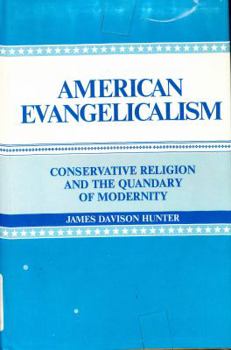American evangelicalism: Conservative religion and the quandary of modernity
Select Format
Select Condition 
Book Overview
No Synopsis Available.
Format:Hardcover
Language:English
ISBN:0813509602
ISBN13:9780813509600
Release Date:January 1983
Publisher:Rutgers University Press
Length:171 Pages
Weight:0.60 lbs.
Customer Reviews
1 rating
Young Evangelicals
Published by Thriftbooks.com User , 15 years ago
James Davison Hunter, a sociologist at the University of Virginia, portrays Evangelical college students in Evangelicalism: The Coming Generation (Chicago: The University of Chicago Press, c. 1987), using data drawn from nine liberal arts Evangelical colleges (members of the Christian College Coalition) and seven Evangelical seminaries. Hunter regards Evangelicalism as indeed the healthiest of American religious sectors, and he endeavors to predict what it will become in the hands of the coming generation. To accomplish this, he focuses on four areas: Evangelicalism's "theology; its view of work, morality, and the self; its ideal of the family; and its political culture" (p. 15). Theologically, he finds young Evangelicals far less certain than were their elders of such things as an inerrant Scripture, a literal hell, of salvation solely through faith in Christ. They frequently value the "social gospel" as much as, if not more than, the traditional evangelical concern for "saving the lost." (Though he labels these issues "theological," he does not in fact treat truly theological themes such as the Trinity, the Incarnation, etc.; here his sociological orientation may blind him to those "theological" concerns young Evangelicals still espouse.) Hunter finds the efforts of Evangelicals to attain scholarly respectability, to escape the ghetto-style mentality of earlier Fundamentalism, subtly eroding the earlier certainties of Evangelicalism's theology. Likewise, he finds data showing the decline of the traditional evangelical work ethic--and especially its "moral asceticism." In earlier times, evangelicals sought to be non-worldly, but today's representatives often seek to identify and conform to the world. Formerly "worldly" activities such as playing cards, social dancing, attending movies, drinking alcohol, are now widely indulged. "In a word," Hunter says, "the Protestant legacy of austerity and ascetic self-denial is virtually obsolete in the larger Evangelical culture and is nearly extinct for a large percentage of the coming generation of Evangelicals" (p. 73). Even the traditional family, once a bedrock certainty for Evangelicals, has lost its moorings. The broader culture's drift toward androgyny (the blurring of sexual roles), has swept along great numbers of Evangelicals. Though far lest feminist-oriented, though far more supportive of the nuclear family, than the "secular" society, Hunter's data indicate "Evangelical family specialists (including many ministers) advocate and defend a model of the family that is said to be traditional but in fact has no real historical precedent (in Christendom or anywhere else) in the name of a constituency that has largely abandoned it in favor of an androgynous/quasi-androgynous model" (p. 114) As Hunter evaluates the evangelical scene, he believes the old certainties have largely dissipated. "Orthodox" belief systems have lost their molding power. Things once ju





